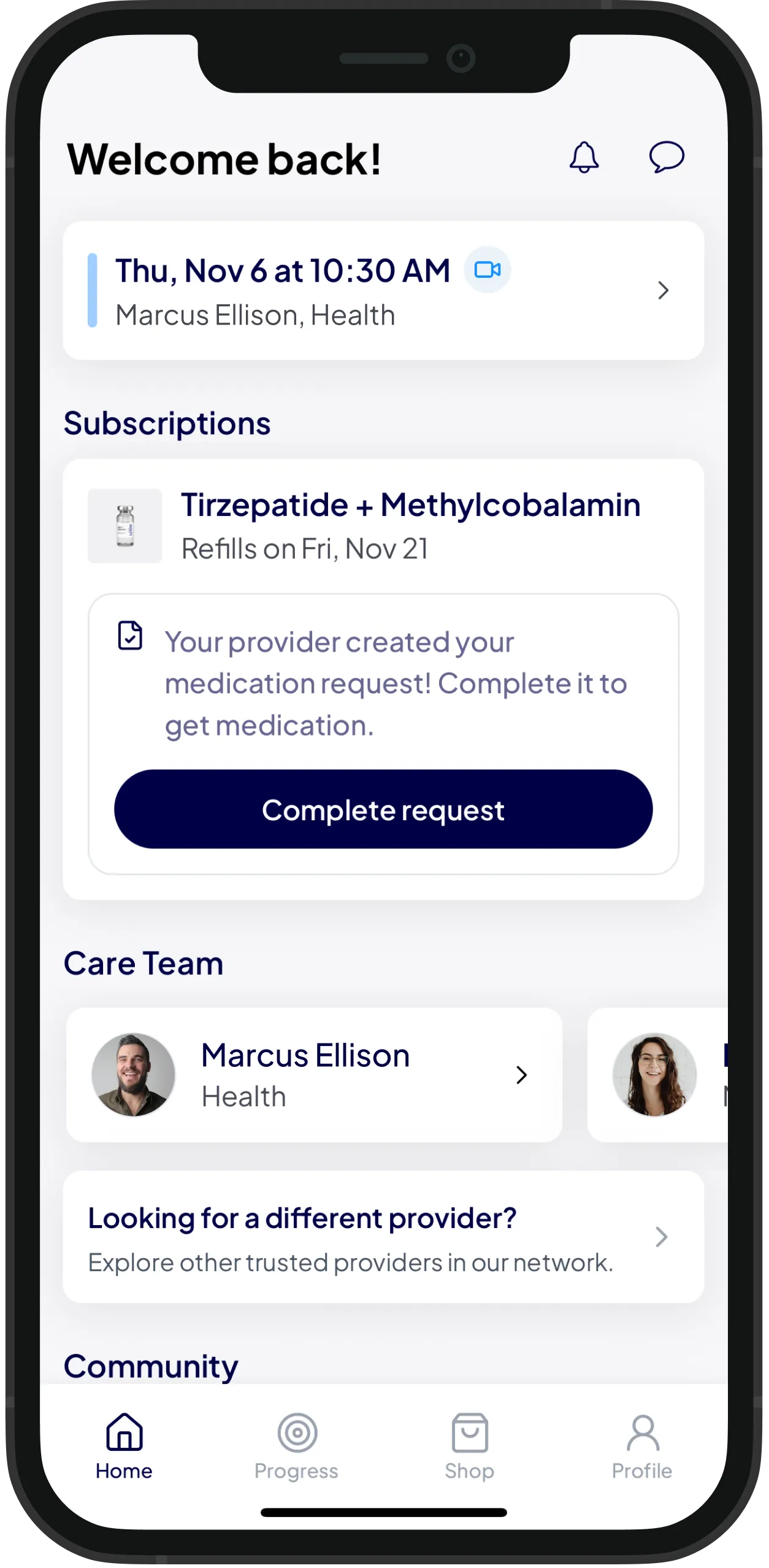Ready to transform your health?
Unlock access to expert guidance and a weight care plan crafted just for you.
Ready to transform your health?
Unlock access to expert guidance and a weight care plan crafted just for you.
Branded medication
Branded medication
Branded medication
Updated on
Updated on
Updated on
Feb 11, 2026
Feb 11, 2026
Feb 11, 2026
Zepbound® for Weight Loss: Dosage, Pricing & More
Zepbound® for Weight Loss: Dosage, Pricing & More
Zepbound® for Weight Loss: Dosage, Pricing & More
Discover Zepbound® for weight loss, including dosage guidelines, pricing details, and more. Get expert insights and support at Mochi Health.
Discover Zepbound® for weight loss, including dosage guidelines, pricing details, and more. Get expert insights and support at Mochi Health.
Discover Zepbound® for weight loss, including dosage guidelines, pricing details, and more. Get expert insights and support at Mochi Health.



Table of Contents
Table of Contents
Table of Contents
How Zepbound® Works
Does Zepbound® Work for Weight Loss?
Who Should Take Zepbound® for Weight Loss?
Is Zepbound® Safe for Weight Loss?
Getting Started on Zepbound® for Weight Loss
How Zepbound® Works
Does Zepbound® Work for Weight Loss?
Who Should Take Zepbound® for Weight Loss?
Is Zepbound® Safe for Weight Loss?
Getting Started on Zepbound® for Weight Loss
How Zepbound® Works
Does Zepbound® Work for Weight Loss?
Who Should Take Zepbound® for Weight Loss?
Is Zepbound® Safe for Weight Loss?
Getting Started on Zepbound® for Weight Loss
Weight loss journeys can be challenging, but the right tools and supplements can make a significant difference. Zepbound® has emerged as a popular weight loss medication, helping individuals achieve their weight management goals more effectively. In this comprehensive guide, we will explore Zepbound®'s role in weight loss, its benefits, efficacy, safety, and much more.
How Zepbound® Works
Zepbound® is a weight loss medication manufactured by Eli Lilly and FDA-approved to aid in weight management for individuals with obesity. (1,2) It functions as a glucose-dependent insulinotropic polypeptide (GIP) receptor and glucagon-like peptide-1 (GLP-1) receptor agonist to help regulate glucagon and insulin levels, promote better glucose control, and aid in weight loss. (1-3)
Zepbound®'s active ingredient, tirzepatide, mimics hormones that help control appetite and blood sugar levels. (3) In doing so, Zepbound® can:
Reduce Appetite: Helps reduce cravings and makes you feel full faster and for longer periods. Users thus consume less calories and end up burning stored fat for energy.
Improve Insulin Sensitivity: Enhancing your body's ability to manage blood sugar levels.
Does Zepbound® Work for Weight Loss?
The effectiveness of Zepbound® in aiding weight loss has been supported by various scientific studies and clinical trials. For example, in the large-scale clinical trial SURMOUNT-1, "adults taking tirzepatide experienced a 15-21% weight loss after 72 weeks (significantly more than only 3% weight loss in the placebo group). (1)
Clinical Evidence On The Benefits of Zepbound®
Change in Body Weight: Participants in the previously mentioned clinical trial experienced a substantial reduction in body weight while on tirzepatide in addition to lifestyle interventions, with many losing up to 20% or more of their initial weight. (1) Lifestyle intervention included regularly scheduled counseling sessions led by either a dietitian or healthcare professional, maintaining a healthy, balanced diet with a 500-calorie deficit, and engaging in a minimum of 150 minutes of physical activity per week.
85% of participants experienced at least a 5% weight reduction with just 5 mg weekly of tirzepatide.
50% of participants in the 10 mg group and 57% in the 15 mg group had at least a 20% (or more!) reduction in body weight at 72 weeks, compared to only 3% in the placebo group. These results have set a new standard for obesity treatment, and researchers are now developing orforglipron, a daily oral GLP-1 that aims to provide similar levels of weight loss in a non-injectable format.
Cardiometabolic Risk Factors: Improvements were observed in several cardiometabolic risk factors, such as blood pressure and cholesterol levels. (1)
Physical Function: Those taking tirzepatide have reported enhanced physical function and overall quality of life. (5)

Who Should Take Zepbound® for Weight Loss?
Zepbound® is designed for adults with an initial body mass index (BMI) of 30 kg/m2 or greater (obesity) or 27 kg/m2 or greater (overweight) with at least one weight-related comorbid condition (e.g., high blood pressure, high cholesterol, or type 2 diabetes). Individuals who meet these criteria can benefit from the weight loss and improved metabolic health (i.e., decreased waist circumference, blood pressure, and cholesterol levels) Zepbound® offers. (1,2)
Is Zepbound® Safe for Weight Loss?
Safety is a primary concern when considering any weight loss supplement. Zepbound® is generally considered safe for any user meeting the above-specified requirements. However, be aware of the precautions and risks outlined in the prescribing information for Zepbound®, which are summarized below:
Potential Side Effects
Gastrointestinal Issues: The most commonly reported side effects from users of Zepbound® include nausea, vomiting, diarrhea, constipation, and/or stomach upset. (1,2) Your provider will work with you to create a personalized dosing schedule with this in mind. Users generally start at the lowest dose and slowly increase to the maximum dose over a span of months to minimize the likelihood of experiencing unpleasant gastrointestinal side effects. It’s important to note that most gastrointestinal side effects are generally mild to moderate and go away in time after your body has gotten used to the medication. (1,2)
Thyroid C-cell Tumors: Animal studies have shown a risk of thyroid tumors and cancer in rodents, but the relevance to humans is still unclear. (2)
Hypersensitivity Reactions: Rare cases of severe allergic reactions have been reported. (2)
Safety Precautions
Consult a Healthcare Provider: Always consult with a healthcare provider before starting Zepbound®, especially if you have a history of thyroid problems or other medical conditions.
Monitor for Side Effects: Be vigilant about any adverse reactions and report them to your doctor immediately, as they may decrease your dose or take you off Zepbound® altogether. While highly unlikely, be sure to notify your provider if you notice a lump or swelling in your neck, experience hoarseness, have difficulty swallowing, or encounter shortness of breath, as these could indicate symptoms of thyroid cancer. (2)
Getting Started on Zepbound® for Weight Loss
Zepbound® offers a promising solution for those looking to achieve effective weight loss. Its ability to reduce appetite, improve insulin sensitivity, and promote fat loss makes it a valuable tool in weight management. However, it is essential to use it safely and under the guidance of a healthcare provider.
Ready to take the next step in your weight loss journey? Find out if you’re eligible for our program to learn how Zepbound® or other GLP-1 medications can help you reach your goals.
With personalized care, direct medical access, and consistent support, Mochi Health is committed to your weight loss success. Explore how our physician-crafted program can help you achieve lasting results.
This post was written by our team of health writers for informational purposes only and does not constitute medical advice. Always consult your doctor or healthcare provider for personalized guidance regarding your health. Ozempic®, Wegovy®, Mounjaro®®, and Zepbound® and their delivery device are registered trademarks. Mochi Health is a telehealth clinic that offers prescriptions for these products by medical necessity only as determined by a licensed health provider.
Sources
Jastreboff AM, Aronne LJ, Ahmad NN, Wharton S, Connery L, Alves B, Kiyosue A, Zhang S, Liu B, Bunck MC, Stefanski A; SURMOUNT-1 Investigators. Tirzepatide Once Weekly for the Treatment of Obesity. N Engl J Med. 2022 Jul 21;387(3):205-216. https://www.nejm.org/doi/full/10.1056/NEJMoa2206038
Highlights of Prescribing Information - Zepbound® (Tirzepatide) Injection. Access Data FDA, Food and Drug Administration, Nov. 2023, https://www.accessdata.fda.gov/drugsatfda_docs/label/2023/217806s000lbl.pdf
Willard, F. S., Douros, J. D., Gabe, M. B., Showalter, A. D., Wainscott, D. B., Suter, T. M., Capozzi, M. E., van der Velden, W. J., Stutsman, C., Cardona, G. R., Urva, S., Emmerson, P. J., Holst, J. J., D'Alessio, D. A., Coghlan, M. P., Rosenkilde, M. M., Campbell, J. E., & Sloop, K. W. (2020). Tirzepatide is an imbalanced and biased dual GIP and GLP-1 receptor agonist. JCI insight, 5(17), e140532. https://doi.org/10.1172/jci.insight.140532
Urva, S., Coskun, T., Loghin, C., Cui, X., Beebe, E., O'Farrell, L., Briere, D. A., Benson, C., Nauck, M. A., & Haupt, A. (2020). The novel dual glucose-dependent insulinotropic polypeptide and glucagon-like peptide-1 (GLP-1) receptor agonist tirzepatide transiently delays gastric emptying similarly to selective long-acting GLP-1 receptor agonists. Diabetes, obesity & metabolism, 22(10), 1886–1891. https://doi.org/10.1111/dom.14110
Wadden, T. A., Chao, A. M., Machineni, S., Kushner, R., Ard, J., Srivastava, G., Halpern, B., Zhang, S., Chen, J., Bunck, M. C., Ahmad, N. N., & Forrester, T. (2023). Tirzepatide after intensive lifestyle intervention in adults with overweight or obesity: the SURMOUNT-3 phase 3 trial. Nature medicine, 29(11), 2909–2918. https://www.nature.com/articles/s41591-023-02597-w
Weight loss journeys can be challenging, but the right tools and supplements can make a significant difference. Zepbound® has emerged as a popular weight loss medication, helping individuals achieve their weight management goals more effectively. In this comprehensive guide, we will explore Zepbound®'s role in weight loss, its benefits, efficacy, safety, and much more.
How Zepbound® Works
Zepbound® is a weight loss medication manufactured by Eli Lilly and FDA-approved to aid in weight management for individuals with obesity. (1,2) It functions as a glucose-dependent insulinotropic polypeptide (GIP) receptor and glucagon-like peptide-1 (GLP-1) receptor agonist to help regulate glucagon and insulin levels, promote better glucose control, and aid in weight loss. (1-3)
Zepbound®'s active ingredient, tirzepatide, mimics hormones that help control appetite and blood sugar levels. (3) In doing so, Zepbound® can:
Reduce Appetite: Helps reduce cravings and makes you feel full faster and for longer periods. Users thus consume less calories and end up burning stored fat for energy.
Improve Insulin Sensitivity: Enhancing your body's ability to manage blood sugar levels.
Does Zepbound® Work for Weight Loss?
The effectiveness of Zepbound® in aiding weight loss has been supported by various scientific studies and clinical trials. For example, in the large-scale clinical trial SURMOUNT-1, "adults taking tirzepatide experienced a 15-21% weight loss after 72 weeks (significantly more than only 3% weight loss in the placebo group). (1)
Clinical Evidence On The Benefits of Zepbound®
Change in Body Weight: Participants in the previously mentioned clinical trial experienced a substantial reduction in body weight while on tirzepatide in addition to lifestyle interventions, with many losing up to 20% or more of their initial weight. (1) Lifestyle intervention included regularly scheduled counseling sessions led by either a dietitian or healthcare professional, maintaining a healthy, balanced diet with a 500-calorie deficit, and engaging in a minimum of 150 minutes of physical activity per week.
85% of participants experienced at least a 5% weight reduction with just 5 mg weekly of tirzepatide.
50% of participants in the 10 mg group and 57% in the 15 mg group had at least a 20% (or more!) reduction in body weight at 72 weeks, compared to only 3% in the placebo group. These results have set a new standard for obesity treatment, and researchers are now developing orforglipron, a daily oral GLP-1 that aims to provide similar levels of weight loss in a non-injectable format.
Cardiometabolic Risk Factors: Improvements were observed in several cardiometabolic risk factors, such as blood pressure and cholesterol levels. (1)
Physical Function: Those taking tirzepatide have reported enhanced physical function and overall quality of life. (5)

Who Should Take Zepbound® for Weight Loss?
Zepbound® is designed for adults with an initial body mass index (BMI) of 30 kg/m2 or greater (obesity) or 27 kg/m2 or greater (overweight) with at least one weight-related comorbid condition (e.g., high blood pressure, high cholesterol, or type 2 diabetes). Individuals who meet these criteria can benefit from the weight loss and improved metabolic health (i.e., decreased waist circumference, blood pressure, and cholesterol levels) Zepbound® offers. (1,2)
Is Zepbound® Safe for Weight Loss?
Safety is a primary concern when considering any weight loss supplement. Zepbound® is generally considered safe for any user meeting the above-specified requirements. However, be aware of the precautions and risks outlined in the prescribing information for Zepbound®, which are summarized below:
Potential Side Effects
Gastrointestinal Issues: The most commonly reported side effects from users of Zepbound® include nausea, vomiting, diarrhea, constipation, and/or stomach upset. (1,2) Your provider will work with you to create a personalized dosing schedule with this in mind. Users generally start at the lowest dose and slowly increase to the maximum dose over a span of months to minimize the likelihood of experiencing unpleasant gastrointestinal side effects. It’s important to note that most gastrointestinal side effects are generally mild to moderate and go away in time after your body has gotten used to the medication. (1,2)
Thyroid C-cell Tumors: Animal studies have shown a risk of thyroid tumors and cancer in rodents, but the relevance to humans is still unclear. (2)
Hypersensitivity Reactions: Rare cases of severe allergic reactions have been reported. (2)
Safety Precautions
Consult a Healthcare Provider: Always consult with a healthcare provider before starting Zepbound®, especially if you have a history of thyroid problems or other medical conditions.
Monitor for Side Effects: Be vigilant about any adverse reactions and report them to your doctor immediately, as they may decrease your dose or take you off Zepbound® altogether. While highly unlikely, be sure to notify your provider if you notice a lump or swelling in your neck, experience hoarseness, have difficulty swallowing, or encounter shortness of breath, as these could indicate symptoms of thyroid cancer. (2)
Getting Started on Zepbound® for Weight Loss
Zepbound® offers a promising solution for those looking to achieve effective weight loss. Its ability to reduce appetite, improve insulin sensitivity, and promote fat loss makes it a valuable tool in weight management. However, it is essential to use it safely and under the guidance of a healthcare provider.
Ready to take the next step in your weight loss journey? Find out if you’re eligible for our program to learn how Zepbound® or other GLP-1 medications can help you reach your goals.
With personalized care, direct medical access, and consistent support, Mochi Health is committed to your weight loss success. Explore how our physician-crafted program can help you achieve lasting results.
This post was written by our team of health writers for informational purposes only and does not constitute medical advice. Always consult your doctor or healthcare provider for personalized guidance regarding your health. Ozempic®, Wegovy®, Mounjaro®®, and Zepbound® and their delivery device are registered trademarks. Mochi Health is a telehealth clinic that offers prescriptions for these products by medical necessity only as determined by a licensed health provider.
Sources
Jastreboff AM, Aronne LJ, Ahmad NN, Wharton S, Connery L, Alves B, Kiyosue A, Zhang S, Liu B, Bunck MC, Stefanski A; SURMOUNT-1 Investigators. Tirzepatide Once Weekly for the Treatment of Obesity. N Engl J Med. 2022 Jul 21;387(3):205-216. https://www.nejm.org/doi/full/10.1056/NEJMoa2206038
Highlights of Prescribing Information - Zepbound® (Tirzepatide) Injection. Access Data FDA, Food and Drug Administration, Nov. 2023, https://www.accessdata.fda.gov/drugsatfda_docs/label/2023/217806s000lbl.pdf
Willard, F. S., Douros, J. D., Gabe, M. B., Showalter, A. D., Wainscott, D. B., Suter, T. M., Capozzi, M. E., van der Velden, W. J., Stutsman, C., Cardona, G. R., Urva, S., Emmerson, P. J., Holst, J. J., D'Alessio, D. A., Coghlan, M. P., Rosenkilde, M. M., Campbell, J. E., & Sloop, K. W. (2020). Tirzepatide is an imbalanced and biased dual GIP and GLP-1 receptor agonist. JCI insight, 5(17), e140532. https://doi.org/10.1172/jci.insight.140532
Urva, S., Coskun, T., Loghin, C., Cui, X., Beebe, E., O'Farrell, L., Briere, D. A., Benson, C., Nauck, M. A., & Haupt, A. (2020). The novel dual glucose-dependent insulinotropic polypeptide and glucagon-like peptide-1 (GLP-1) receptor agonist tirzepatide transiently delays gastric emptying similarly to selective long-acting GLP-1 receptor agonists. Diabetes, obesity & metabolism, 22(10), 1886–1891. https://doi.org/10.1111/dom.14110
Wadden, T. A., Chao, A. M., Machineni, S., Kushner, R., Ard, J., Srivastava, G., Halpern, B., Zhang, S., Chen, J., Bunck, M. C., Ahmad, N. N., & Forrester, T. (2023). Tirzepatide after intensive lifestyle intervention in adults with overweight or obesity: the SURMOUNT-3 phase 3 trial. Nature medicine, 29(11), 2909–2918. https://www.nature.com/articles/s41591-023-02597-w
Weight loss journeys can be challenging, but the right tools and supplements can make a significant difference. Zepbound® has emerged as a popular weight loss medication, helping individuals achieve their weight management goals more effectively. In this comprehensive guide, we will explore Zepbound®'s role in weight loss, its benefits, efficacy, safety, and much more.
How Zepbound® Works
Zepbound® is a weight loss medication manufactured by Eli Lilly and FDA-approved to aid in weight management for individuals with obesity. (1,2) It functions as a glucose-dependent insulinotropic polypeptide (GIP) receptor and glucagon-like peptide-1 (GLP-1) receptor agonist to help regulate glucagon and insulin levels, promote better glucose control, and aid in weight loss. (1-3)
Zepbound®'s active ingredient, tirzepatide, mimics hormones that help control appetite and blood sugar levels. (3) In doing so, Zepbound® can:
Reduce Appetite: Helps reduce cravings and makes you feel full faster and for longer periods. Users thus consume less calories and end up burning stored fat for energy.
Improve Insulin Sensitivity: Enhancing your body's ability to manage blood sugar levels.
Does Zepbound® Work for Weight Loss?
The effectiveness of Zepbound® in aiding weight loss has been supported by various scientific studies and clinical trials. For example, in the large-scale clinical trial SURMOUNT-1, "adults taking tirzepatide experienced a 15-21% weight loss after 72 weeks (significantly more than only 3% weight loss in the placebo group). (1)
Clinical Evidence On The Benefits of Zepbound®
Change in Body Weight: Participants in the previously mentioned clinical trial experienced a substantial reduction in body weight while on tirzepatide in addition to lifestyle interventions, with many losing up to 20% or more of their initial weight. (1) Lifestyle intervention included regularly scheduled counseling sessions led by either a dietitian or healthcare professional, maintaining a healthy, balanced diet with a 500-calorie deficit, and engaging in a minimum of 150 minutes of physical activity per week.
85% of participants experienced at least a 5% weight reduction with just 5 mg weekly of tirzepatide.
50% of participants in the 10 mg group and 57% in the 15 mg group had at least a 20% (or more!) reduction in body weight at 72 weeks, compared to only 3% in the placebo group. These results have set a new standard for obesity treatment, and researchers are now developing orforglipron, a daily oral GLP-1 that aims to provide similar levels of weight loss in a non-injectable format.
Cardiometabolic Risk Factors: Improvements were observed in several cardiometabolic risk factors, such as blood pressure and cholesterol levels. (1)
Physical Function: Those taking tirzepatide have reported enhanced physical function and overall quality of life. (5)

Who Should Take Zepbound® for Weight Loss?
Zepbound® is designed for adults with an initial body mass index (BMI) of 30 kg/m2 or greater (obesity) or 27 kg/m2 or greater (overweight) with at least one weight-related comorbid condition (e.g., high blood pressure, high cholesterol, or type 2 diabetes). Individuals who meet these criteria can benefit from the weight loss and improved metabolic health (i.e., decreased waist circumference, blood pressure, and cholesterol levels) Zepbound® offers. (1,2)
Is Zepbound® Safe for Weight Loss?
Safety is a primary concern when considering any weight loss supplement. Zepbound® is generally considered safe for any user meeting the above-specified requirements. However, be aware of the precautions and risks outlined in the prescribing information for Zepbound®, which are summarized below:
Potential Side Effects
Gastrointestinal Issues: The most commonly reported side effects from users of Zepbound® include nausea, vomiting, diarrhea, constipation, and/or stomach upset. (1,2) Your provider will work with you to create a personalized dosing schedule with this in mind. Users generally start at the lowest dose and slowly increase to the maximum dose over a span of months to minimize the likelihood of experiencing unpleasant gastrointestinal side effects. It’s important to note that most gastrointestinal side effects are generally mild to moderate and go away in time after your body has gotten used to the medication. (1,2)
Thyroid C-cell Tumors: Animal studies have shown a risk of thyroid tumors and cancer in rodents, but the relevance to humans is still unclear. (2)
Hypersensitivity Reactions: Rare cases of severe allergic reactions have been reported. (2)
Safety Precautions
Consult a Healthcare Provider: Always consult with a healthcare provider before starting Zepbound®, especially if you have a history of thyroid problems or other medical conditions.
Monitor for Side Effects: Be vigilant about any adverse reactions and report them to your doctor immediately, as they may decrease your dose or take you off Zepbound® altogether. While highly unlikely, be sure to notify your provider if you notice a lump or swelling in your neck, experience hoarseness, have difficulty swallowing, or encounter shortness of breath, as these could indicate symptoms of thyroid cancer. (2)
Getting Started on Zepbound® for Weight Loss
Zepbound® offers a promising solution for those looking to achieve effective weight loss. Its ability to reduce appetite, improve insulin sensitivity, and promote fat loss makes it a valuable tool in weight management. However, it is essential to use it safely and under the guidance of a healthcare provider.
Ready to take the next step in your weight loss journey? Find out if you’re eligible for our program to learn how Zepbound® or other GLP-1 medications can help you reach your goals.
With personalized care, direct medical access, and consistent support, Mochi Health is committed to your weight loss success. Explore how our physician-crafted program can help you achieve lasting results.
This post was written by our team of health writers for informational purposes only and does not constitute medical advice. Always consult your doctor or healthcare provider for personalized guidance regarding your health. Ozempic®, Wegovy®, Mounjaro®®, and Zepbound® and their delivery device are registered trademarks. Mochi Health is a telehealth clinic that offers prescriptions for these products by medical necessity only as determined by a licensed health provider.
Sources
Jastreboff AM, Aronne LJ, Ahmad NN, Wharton S, Connery L, Alves B, Kiyosue A, Zhang S, Liu B, Bunck MC, Stefanski A; SURMOUNT-1 Investigators. Tirzepatide Once Weekly for the Treatment of Obesity. N Engl J Med. 2022 Jul 21;387(3):205-216. https://www.nejm.org/doi/full/10.1056/NEJMoa2206038
Highlights of Prescribing Information - Zepbound® (Tirzepatide) Injection. Access Data FDA, Food and Drug Administration, Nov. 2023, https://www.accessdata.fda.gov/drugsatfda_docs/label/2023/217806s000lbl.pdf
Willard, F. S., Douros, J. D., Gabe, M. B., Showalter, A. D., Wainscott, D. B., Suter, T. M., Capozzi, M. E., van der Velden, W. J., Stutsman, C., Cardona, G. R., Urva, S., Emmerson, P. J., Holst, J. J., D'Alessio, D. A., Coghlan, M. P., Rosenkilde, M. M., Campbell, J. E., & Sloop, K. W. (2020). Tirzepatide is an imbalanced and biased dual GIP and GLP-1 receptor agonist. JCI insight, 5(17), e140532. https://doi.org/10.1172/jci.insight.140532
Urva, S., Coskun, T., Loghin, C., Cui, X., Beebe, E., O'Farrell, L., Briere, D. A., Benson, C., Nauck, M. A., & Haupt, A. (2020). The novel dual glucose-dependent insulinotropic polypeptide and glucagon-like peptide-1 (GLP-1) receptor agonist tirzepatide transiently delays gastric emptying similarly to selective long-acting GLP-1 receptor agonists. Diabetes, obesity & metabolism, 22(10), 1886–1891. https://doi.org/10.1111/dom.14110
Wadden, T. A., Chao, A. M., Machineni, S., Kushner, R., Ard, J., Srivastava, G., Halpern, B., Zhang, S., Chen, J., Bunck, M. C., Ahmad, N. N., & Forrester, T. (2023). Tirzepatide after intensive lifestyle intervention in adults with overweight or obesity: the SURMOUNT-3 phase 3 trial. Nature medicine, 29(11), 2909–2918. https://www.nature.com/articles/s41591-023-02597-w
Read next
Ready to transform your health?
Unlock access to expert guidance and a weight care plan crafted just for you.

Ready to transform your health?
Unlock access to expert guidance and a weight care plan crafted just for you.

Ready to transform your health?
Unlock access to expert guidance and a weight care plan crafted just for you.


© 2026 Mochi Health
All professional medical services are provided by licensed physicians and clinicians affiliated with independently owned and operated professional practices. Mochi Health Corp. provides administrative and technology services to affiliated medical practices it supports, and does not provide any professional medical services itself.


© 2026 Mochi Health
All professional medical services are provided by licensed physicians and clinicians affiliated with independently owned and operated professional practices. Mochi Health Corp. provides administrative and technology services to affiliated medical practices it supports, and does not provide any professional medical services itself.


© 2026 Mochi Health
All professional medical services are provided by licensed physicians and clinicians affiliated with independently owned and operated professional practices. Mochi Health Corp. provides administrative and technology services to affiliated medical practices it supports, and does not provide any professional medical services itself.






















